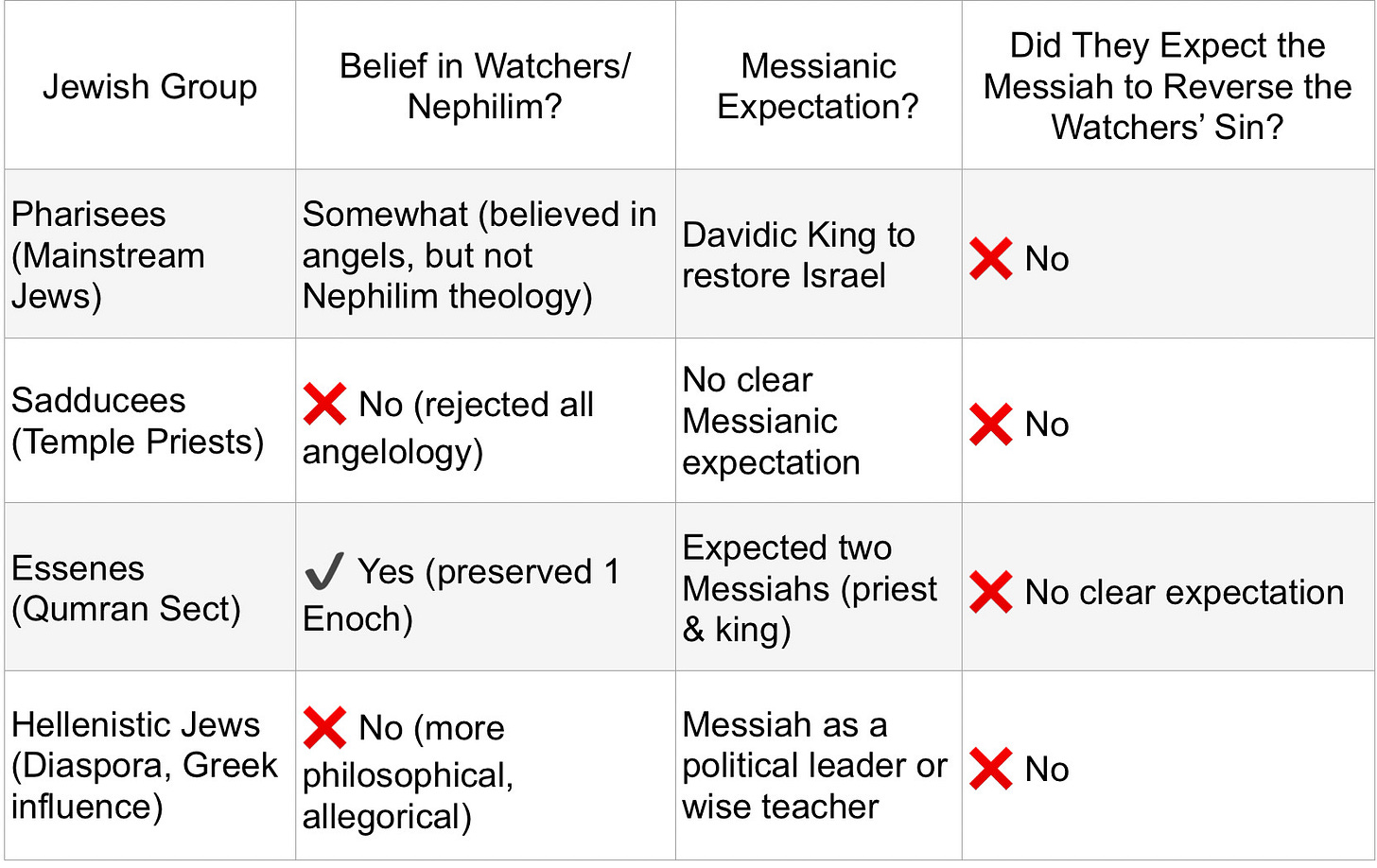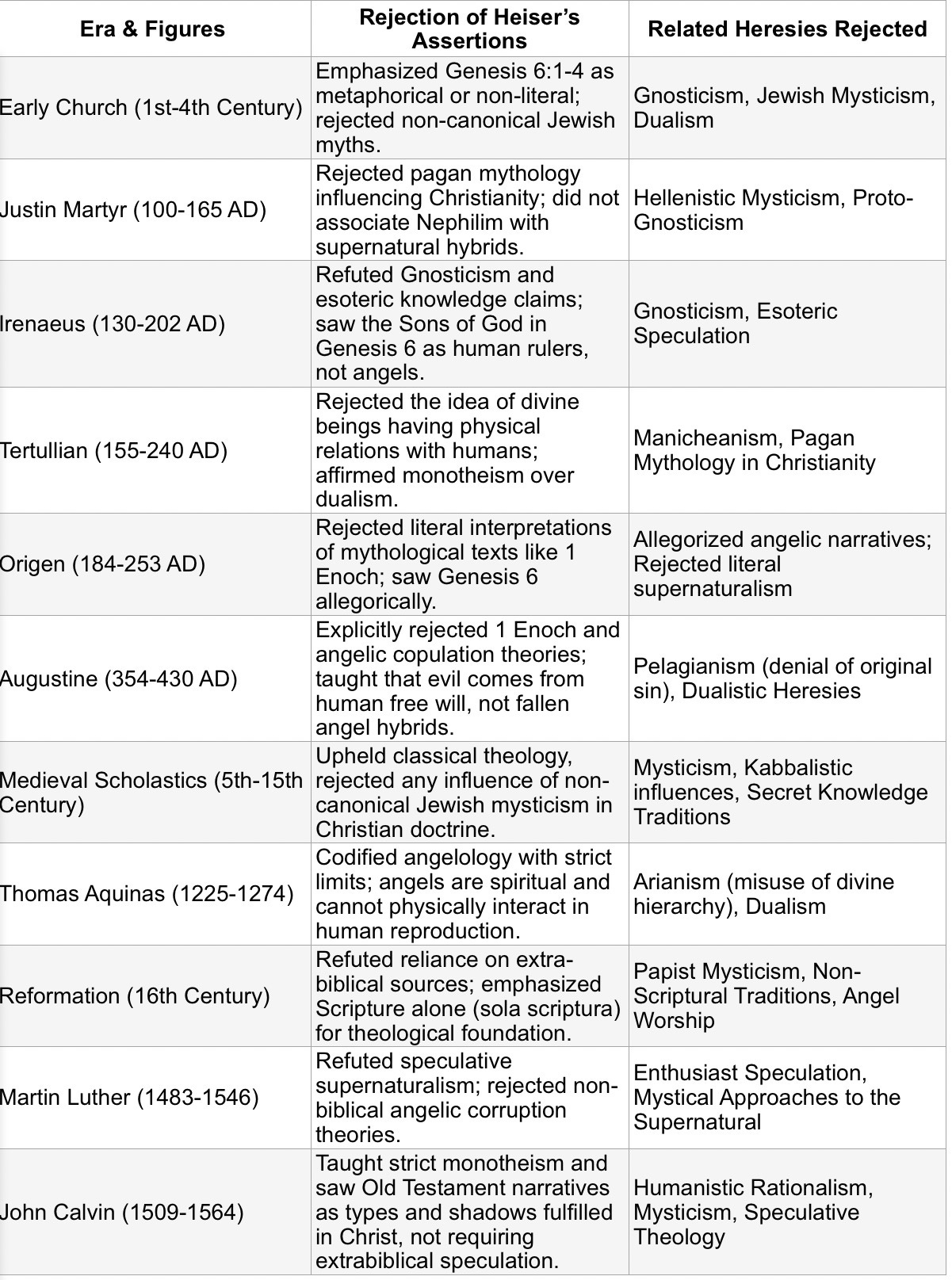First century Messianic expectations
Michael Heiser claimed that first-century Jews expected the Messiah to “reverse the sin of the Watchers”, but this raises an important question: Which Jews?
The Jewish world of the first century was highly diverse, with different groups holding widely varying theological views. Below is an analysis of the major Jewish sects and whether any of them actually believed in the Watchers mythology from 1 Enoch as a key expectation for the Messiah.
1. Pharisees (Mainstream Judaism)
🔹 Did They Believe the Messiah Would Reverse the Sin of the Watchers?
❌ No. The Pharisees’ Messianic expectation was based on the Law of Moses and the Davidic Covenant—not on 1 Enoch.
🔹 What Did the Pharisees Believe About the Messiah?
• They expected a Davidic king who would restore Israel, defeat Rome, and establish God’s rule.
• Their focus was on Torah observance, resurrection, and the coming Kingdom of God (Daniel 7, Isaiah 9, etc.).
• They did believe in angels, resurrection, and the supernatural, but there is no evidence that they cared about the Watchers or the Nephilim as part of their theology.
🔹 How This Contradicts Heiser:
• Heiser claims that Jewish expectations of the Messiah included reversing the sin of the Watchers—but the Pharisees, the dominant Jewish group of the time, had no such expectation.
2. Sadducees (Priestly Aristocracy, Temple Leadership)
🔹 Did They Believe the Messiah Would Reverse the Sin of the Watchers?
❌ No. The Sadducees did not even believe in angels, spirits, or the afterlife (Acts 23:8), so they certainly did not accept the mythology of 1 Enoch.
🔹 What Did the Sadducees Believe?
• They were strictly focused on the Torah (first five books of Moses) and rejected later Jewish traditions.
• They did not believe in supernatural beings, fallen angels, or an apocalyptic view of history.
• They were closely aligned with Rome and were mainly interested in maintaining their political power in the Temple.
🔹 How This Contradicts Heiser:
• Since the Sadducees rejected even basic angelology, they would have completely dismissed 1 Enoch and the Watchers myth.
• There is no way they saw the Messiah’s role as reversing the sin of the Watchers—because they didn’t believe in the Watchers at all.
3. Essenes (Qumran, Dead Sea Scrolls Sect)
🔹 Did They Believe the Messiah Would Reverse the Sin of the Watchers?
✔️ Possibly, but not clearly. The Essenes were the most influenced by apocalyptic literature like 1 Enoch, but they did not develop a Watchers-based Messianic expectation.
🔹 What Did the Essenes Believe?
• They expected two Messiahs:
1. A priestly Messiah (from the line of Aaron).
2. A kingly Messiah (from the line of David).
• Their theology was highly apocalyptic, influenced by Daniel, Isaiah, and 1 Enoch.
• They did believe that fallen angels influenced human corruption, but they saw their own sect as the faithful remnant awaiting divine intervention.
🔹 How This Partially Aligns With Heiser:
• The Essenes are the only known Jewish sect that engaged with Enochian angelology.
• They preserved the Book of 1 Enoch among the Dead Sea Scrolls.
• They did believe that evil spirits influenced the world, but they never said the Messiah’s mission was to “reverse the sin of the Watchers.”
🔹 How This Contradicts Heiser:
• While they were aware of the Watchers myth, their Messianic expectations did not focus on reversing angelic sin.
• They were concerned with the purity of Israel, expecting God’s intervention against Rome and corrupt Jewish leaders—not against fallen angels.
4. Hellenistic Jews (Alexandria, Diaspora Jews)
🔹 Did They Believe the Messiah Would Reverse the Sin of the Watchers?
❌ No. Hellenistic Jews were more influenced by Greek philosophy than apocalyptic literature like 1 Enoch.
🔹 What Did Hellenistic Jews Believe?
• They were strongly influenced by Greek philosophy (Plato, Stoicism, etc.).
• Many adopted allegorical interpretations of Scripture (like Philo of Alexandria).
• They were less concerned with angelic beings and more interested in ethical and philosophical interpretations of Judaism.
🔹 How This Contradicts Heiser:
• The Hellenistic Jews had little interest in Enochian myths and were more focused on rational philosophy.
• They did not expect the Messiah to reverse supernatural corruption—they saw the Messiah as a political or philosophical leader.
Conclusion: Heiser’s Claim About First-Century Jews Is Misleading
Final Verdict:
• The Pharisees (mainstream Jews) did not expect the Messiah to reverse the Watchers’ sin.
• The Sadducees rejected the entire supernatural worldview behind the Watchers.
• The Essenes believed in fallen angels but did not frame their Messianic hopes around them.
• The Hellenistic Jews had no interest in this mythology at all.
🚨 This means that Heiser’s claim is at best an exaggeration, and at worst misleading.
• The idea that the Messiah came to “reverse the Watchers’ sin” is not found in Scripture or mainstream first-century Jewish theology.
• Jesus’ mission was framed around God’s promises to Israel, the Fall of humanity (Genesis 3), and the Abrahamic and Davidic Covenants—not reversing an angelic rebellion from 1 Enoch.
• If this was truly a core expectation, why is it not clearly stated anywhere in the Gospels, Paul’s letters, or Jewish rabbinic writings?
Heiser retroactively applies a fringe Second Temple Jewish tradition to Jesus’ mission rather than drawing from the actual biblical text. His claim does not hold up historically and should be rejected as an overreach based on selective evidence.
If Heiser argues that “Jews of the first century expected the Messiah to reverse the sin of the Watchers,” then he needs to specify which Jews.
Historical Rejection of Heiser’s Assertions: Church Fathers and Theological Opposition to Angelic-Human Hybrids
Key Takeaways
• The early Church Fathers rejected the angelic-human hybrid interpretation of Genesis 6, favoring either the “Sons of God” as human rulers (the Sethite view) or metaphorical interpretations.
• 1 Enoch was rejected as Scripture, and theologians from Augustine to Aquinas reinforced the idea that angels are purely spiritual beings, incapable of reproduction.
• The medieval and Reformation theologians rejected mystical speculation and emphasized sola scriptura over extrabiblical sources like 1 Enoch.
• Many of the heresies that had to be refuted—such as Gnosticism, Manichean dualism, and speculative angelology—align closely with the errors found in Heiser’s framework.
🚨 Bottom Line: The Christian tradition has overwhelmingly rejected the kind of theology Heiser promotes for over 2,000 years. His ideas are not a rediscovery of lost biblical truth, but a revival of rejected myths and heresies.


